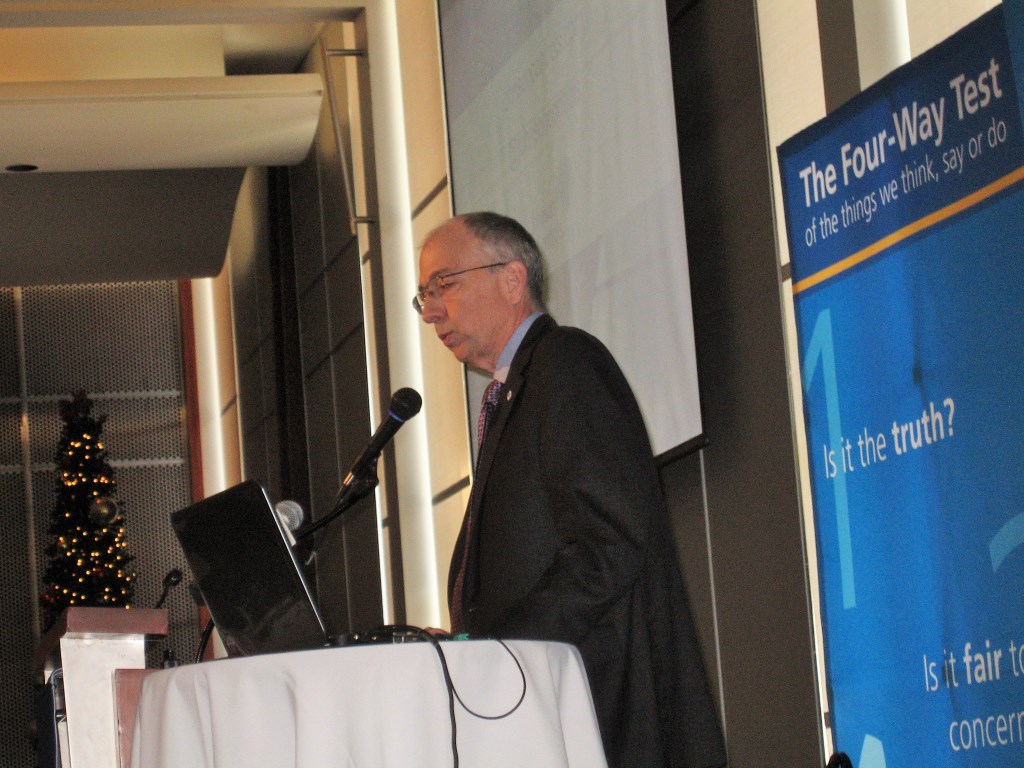Why Is CEO Pay Still Soaring?
Up 8.5% last year, hitting obscene levels in state and nation. Why?
The media did their annual analysis of corporate executive pay in America last week and the news was good — for CEOs. For the rest of us the latest rise in executive pay was evidence that the wealth gap in the U.S. — the largest its been since the federal income tax was created in 1913 — is getting still bigger.
Topped by Thomas Rutledge of Charter Communications, who took home an astounding $98 million last year, the average CEO at the biggest 346 American companies “got an 8.5 percent raise last year, raking in $11.5 million in salary, stock and other compensation,” according to a study by executive data firm Equilar for the Associated Press.
The annual study by the AFL-CIO’s Executive Paywatch found the average compensation for CEOs running the S&P 500 companies was $13.1 million in 2016, or 347 times higher than the average American’s salary of $37,632.
“Some 50 years ago,” the New York Times reported, “the typical chief executive made just 20 times what an employee did.”
In Wisconsin top CEOs are doing very well indeed. Looking at the biggest companies in the metro area, retiring Johnson Controls CEO Alex Molinaroli was the big winner, bringing home an astounding $46.4 million. Here’s the list of local CEO pay and how many times larger it was than average employee pay:
2016 Greater Milwaukee CEO Pay vs. Average Worker
| CEO | Company> | Pay | X Times More |
|---|---|---|---|
| Alex Molinaroli | Johnson Controls | $46.4 million | 1,233 |
| Jeffery Yabuki | Fiserv, Inc. | $21.24 million | 654 |
| Allen Leverett | WI Energy Corp. | $11.5 million | 305 |
| Jonas Prising | ManpowerGroup | $10.99 million | 292 |
| Matthew Levatich | Harley-Davidson | $9.35 million | 248 |
| Kevin Mansell | Kohl’s Corporation | $8.40 million | 223 |
| Ajita Rajendra | A. O. Smith Corp. | $7.3 million | 194 |
| Keith Nosbusch | Rockwell Automation | $7.23 million | 192 |
How is that executive pay has risen so incredibly while average worker pay has barely budged over the last five decades? Defenders of CEO compensation — and they are hard to find — argue this stratospheric increase in compensation is the market at work.
But if there was a marketplace for CEOs the best ones would get the biggest raises. In fact, the highest paid CEOs are typically the worst performers, research has shown. The reality is that CEOs work within a closed circle of insiders who call the shots on their own pay.
For starters they sit on each other’s boards, which may lead to mutual “backscratching,” as one study of the top 1000 companies in the nation found. The study also found power on corporate boards has “a startling amount of overlap,” with more than 1,000 corporate board members sitting on four or more corporate boards, and 235 sitting on more than six.
And the corporate board members who oversee chief executive pay are paid a generous fee by that company, which has lately been rising even faster than CEO pay. Board members of the top 500 corporations were paid an average of $255,000 in 2014, which had increased 50 percent since 2006.
And that $255,000 was just the average pay for board members who “report that they generally work fewer than five hours per week, as a Boston Globe investigation noted. “Michael Heffernan earned $1 million from Ocata Therapeutics Inc. in Marlborough last year… William D. Young received $1.7 million in compensation from Vertex Pharmaceuticals Inc. of Boston. And Phillip A. Sharp hauled in $1.9 million from Cambridge-based Alnylam Pharmaceuticals Inc.,” the story noted.
“Some say the director pay at some companies has become so lucrative that it could discourage directors from questioning excessive perks for chief executives for fear of upsetting the rest of the board and losing their coveted positions,” the report noted.
Meanwhile those well-paid board members typically use “competitive benchmarking,” another study found, where “compensation levels are generally targeted to either the 50th, 75th, or 90th percentile” of a CEO’s peers. If everyone gets compensation at the 50th percentile or above, average compensation will ratchet up dramatically. The practice “inevitably leads to an upward movement of executive compensation,” the study found.
One effort to broaden the closed circle governing CEO pay was the say-on-pay rule required under the Dodd-Frank Act — whereby shareholders could give thumbs up or down to executives’ earnings. Under an SEC rule which went into effect in 2011 this vote must occur at least once every three years.
The idea was to more closely align the interests of stockholders and the companies they invest in, and there is some evidence the law had an impact on CEO pay. But not in most cases. As one study found, “only a tiny percentage of corporations and their CEOs have been on the losing end of say-on-pay votes.
The “only time shareholders feel a loss and tend to vote no is when a company performs below average and its CEO’s pay is high,” the study found. “When a company performs above average and the CEO is well-paid, or when a company performs poorly under a poorly paid CEO, shareholders feel neutral and tend to vote yes. When a company performs well and the CEO is underpaid, shareholders feel they’ve gained and again vote yes.”
In short, shareholders are not surprisingly out to get the best return on their stocks. Yet even this modest restraint on CEO pay may be watered down: Proposed legislation in Washington would change from requiring say on pay every three years to trigger it only when executives’ compensation packages have changed “materially” from the previous year.
Meanwhile, say on pay does nothing about the wealth gap, because most Americans don’t own stock. The wealthiest 20 percent of Americans owned 92 percent of all investments in stocks in 2013. And a key way American CEOs have increased company profits and shareholder return is by outsourcing American jobs to other countries, fighting unions and driving down wages of workers. The policies that make more money for executives and shareholders alike are helping to drive the wealth gap in America and leave average workers falling ever further behind. Which is why you can expect CEO pay to soar ever higher in the years to come.
If you think stories like this are important, become a member of Urban Milwaukee and help support real independent journalism. Plus you get some cool added benefits, all detailed here.
Murphy's Law
-
National Media Discovers Mayor Johnson
 Jul 16th, 2024 by Bruce Murphy
Jul 16th, 2024 by Bruce Murphy
-
Milwaukee Arts Groups in Big Trouble
 Jul 10th, 2024 by Bruce Murphy
Jul 10th, 2024 by Bruce Murphy
-
The Plague of Rising Health Care Costs
 Jul 8th, 2024 by Bruce Murphy
Jul 8th, 2024 by Bruce Murphy























Poor Bruce, he ain’t got it, wants to get it but not going to get it so he whines. Fact is that the stockholders decide what they pay, if they do not like it sell your stock. Other than that none of your business. These people, leaders, have to compete in a world wide market and they need the top peoplel. ford is best example.
I am greatly perplexed when I see the common man defending the obscene wealth of the corporate elite. The amount of propaganda and the duration of exposure to it necessary to achieve this absolute brainwashing at once startles, amazes and saddens me. How does one not see the correlation between extreme wealth and extreme poverty and disenfranchisement?
The corporate elite own the vast majority of our country and our political system. They need not the likes of WCD coming to their defense.
We need more women CEO’s at least then we can pay them a third less.
Sure Adam, read Marx lately. Really stupid, check out Venezuela and find out where your ideas take you. Capitalism is what took people out of poverty. go to socialist counties and see real poverty.
key fact missing. THis is from 346 largest PUBLICLY TRADED companies. I am sure private company CEOs are more disproportionate. They all shold ta least be forced to open thir homes for public tours one sunday a month.
One man’s civilization
is another man’s jungle, yeah
They say revolution’s in the air
I’m dancing in my underwear
’cause I don’t care
Hey diddle diddle
The Cat’s in the fiddle
Piggy in the middle
Doo-a-poo-poo
Doo-a-poo-poo
And to Adam. The important correlation is between extreme wealth and extreme poverty and revolution. The very wealthy would do well to consider how the growing disparity tilts the gameboard toward revolution. Besides, in the true trickle-down economic model, the poor are the hills, the wealthy are the sea and water is money. Money in the hills always flows back to the sea.
Yet more evidence against merit pay as tying CEO pay to company performance does not result in any improvement in company performance.
The greed Bruce points out is disgusting. Income inequality threatens democracy. I hope the greedy sleep comfortably knowing they are paving the way for the end of democracy as we know it. There is a reason our political system is more polarized, corrupt and threatened by oligarchs than in the past. The rich take down the unions, destroy the middle class, buy off politicians and middle America languishes in poverty. WCD is clueless.
If you think the economic system in this country has any resemblance to the capitalist model described by Adam Smith, I have a bridge to sell you, real cheap. Granted Adam Smith was an idealist as was Karl Marx (no communist system ever put into resembled his model either). But to call the economic system in the US capitalism is to miss the value Smith placed on labor in the production equation. We are still operating under the production equation of the Mercantile system where labor is considered a necessary evil. Labor costs have be held to a minimum (slavery was a very good fit.) Mercantilism is predicated on a finite amount of wealth. We have seen the industrial and the technological revolutions. And we know that wealth is not finite but exponential. The more people participating in the economy the more possibility for everyone to grow wealth. Concentrating wealth at the top is bad for the economy and bad for everyone in the long term. It limits everyone’s ability to generate wealth, even those CEOs making obscene salaries today.
American CEO pay is absurd. I got a 2 percent raise this year, and 1.3 percent the two years before that. And I’m a top performer. The measly 2 percent is what the back-scratching board of directors recommended for the rank-and-file. Not a top performer? You get less than 2 percent. That amount, for me, just keeps me breaking even with the previous year after COL adjustments and the never-ending increases in health care costs.
Mary Kay, I am so excited to hear your plan.
SS did not get any increase last year but we are not managing anything. US is world leader it needs world class managers and they are not avaialble for #$15/jhour.
That is such disingenuous nonsense. No one said anything about paying CEO’s $15 per hour.
Disingenuous, under what this group wants, they want the power do set salaries for international companies that can be moved almost anyplace in the world that they want.
You think that this is cogent discussion. Never happen, never will. Sheer wast of time.
Let us work on things that none of you have seen the ability to solve: Carjackings, crime, shooting, MPS, kids cannot read, heroin epidemic cause of POTuse, abandoned homes, bad roads, corrutpion in Milwaukee, top ten worst run city , top ten most violent, Milwuakee county govt,MMSD biggest joke in state, and on.
Now all of you dullards here that is some really important things you might discuss and find solutions too, but instead want to use energy discussing something you will never have any control over unless you are stockholder. Cheap crap, Bruce.
Nothing with you is cogent discussion. Look at that 12:33pm for exhibit no. 1.
First off WI Conservative Digest, if you’re a representative of that entity, you’re sure not doing any good PR by coming on here and calling people names. Second, I am a stockholder in a few companies whose CEOs I would argue aren’t deserving of their outsized pay, and my voice doesn’t do shit. I don’t think anyone is asking for the power to set salaries for others, just for them to act like decent human beings and check their greed (Bill and Melinda Gates types excepted).
Sell the stock, write letters. This debate is meaningless. No one will ever pass law regulating this unless they want to see exodus.
WCD using your logic all debates are meaningless. You are saying that because real change is hard and likely won’t ever be accomplished, it’s pointless to even talk about it. That can be applied to countless issues.
No one on this site has ever managed anything of note, solved any problems they talk about to Bye. Waste of time. You silly socialists can talk to Bernie who made million last year sold out to the Clintons for bundle.
This whole site is a waste of time apparently, which begs the question why does Bob Dohnal (Wisconsin Conservative Digest) comment on here almost daily?
Now that is an excellent question. Instead of accomplishing meaningful things, he spends all day calling people names here. That sure is noteworthy WCD!
WCD (post 1),
You said, “Fact is that the stockholders decide” CEO pay.
That is TOTALLY untrue.
I’ve been in the stock market since about 1990, and have NEVER seen shareholders asked to approve an executive’s salary.
And it’s not like we can just vote out the CEO because shareholders can’t vote for the CEO; the Board chooses the CEO.
In theory shareholders can vote out the Board, but 99% of annual corporate meetings have soviet-style elections—where the number of candidates offered to shareholders exactly equals the number of open slots (eg 7 candidates listed for 7 directorships).
While, in theory, shareholders have the right to vote against one or more directors, even if 99% of shareholders vote against a particular director, it doesn’t matter; all they need is one vote in favor. The only way shareholders can vote out a director in a typical soviet-style election is if EVERYBODY withholds their vote for that director, but that never happens because the directors typically (but not always) also own shares and vote for themselves.
Selling your shares doesn’t change anything because the new shareholders will have no more power than you.
CEO pay is set by the Board of Directors, not the shareholders.
Period.
Whether or not CEOs are overpaid (I happen to think they are) can be debated, but claiming that shareholders determine the CEO’s pay is a TOTAL LIE.
A lot of CEO’s pay is indeed extremely out of whack. Molinaroli is a prime example… he really screwed over employee’s and shareholders because of how the JCI/Tyco merger was structured and so far projections aren’t even panning out for the new combined company. While it’s too soon to judge if it was a good move or not, the personal profit’s he’s made are incredible.
That being said… this isn’t public money, employee’s of JCI are not beholden to work there, and shareholders, in theory, have the power to involve the justice system if there is true malfeasance. So what does it really matter to the general population if a CEO makes a hundred dollars or a hundred million?
Tom D, I don’t generally disagree with you… except that there is power in holding stock. As pointed out in another article on UrbanMilwaukee, most stocks are owned by the rich. You only need one rich person who doesn’t like whats going on to start a movement to change out the board. While there’s a lot of friendly faces approving pay and doing favors, not all shareholders are on board with that.
I don’t see this happening often for this reason, but it does/can happen. Maybe as CEO pay continues to get out of hand we’ll see it more? I don’t expect it, but one can dream.
“So what does it really matter to the general population if a CEO makes a hundred dollars or a hundred million?”
That’s a pretty stupid question especially considering inequality continues to increase. Why do people care that athletes and movie stars are paid so much, especially when their movie’s tank or their performance on the field/court is mediocre or worse? The better question is why shouldn’t people care about individuals making obscene amounts of money when the performance of the individual doesn’t match the compensation. It would be odd for people not to care about that.
“How Much Does Your CEO Make? Here’s Why it Matters”
https://www.glassdoor.com/blog/ceo-pay/
I’m not saying workers at a company or it’s shareholders shouldn’t care… I’m just wondering why someone completely unaffiliated would care.
Also, your calling that a stupid question is stupid. If we’re being mature about it… And do you really care how much a celebrity makes? Why waste your time with that?
Why shouldn’t unaffiliated people care?
It is absolutely a stupid question. I didn’t say I personally care about that. I said it’s not trivial for people to concern themselves with exorbitant salaries.
K, so answer the question then and actually add something of value to the conversation. Tell me why you, who is not a shareholder and don’t work for a company, should care how much the CEO makes.
(I didn’t even actually say you shouldn’t care, but I thought it would be interesting for people to give actual reasons and have an actual constructive conversation. I apologize if that was beyond you, feel free to move on if it is)
Man, you must sleep well with that high of a level of ignorance.
I’m concerned that the Trump administration is “gutting science” even though I’m not a scientist. I’m concerned about the climate Walker and minions created for the teaching profession in WI even though I’m not a teacher. We should care about things.
You can’t silo the problem off into a single company issues, talk about them all separately, and then decide it’s not a problem because there are no personal links. To do so ignores the system and the context. BTW, I mean “can’t” in the logical fallacy sense, not in the high-minded-libtard telling you how to act sense, so don’t start another distraction.
CEO Alex Molinaroli Johnson Controls has 150, 000 workers and their families under his leadership and were upset he makes NBA player type money.
CEO pay is soaring….BECAUSE THEY CAN! That’s the only reason these greedheads need.
And those millions being given to CEOs are millions that aren’t going back to workers or other societal needs/members that are likely much more worthy of the cash than some suit in a boardroom who likely wasn’t the one who built the business, and often isn’t anyone that has a special talent beyond kissing up to the right people.
Not to mention having affairs and supporting Ponzi schemers. Right Troll Jason?
Let us look was CEO Alex Molinaroli did for his shareholders many of whom are public sector employees through their public.pensions. Molinaroli spun off the automotive part of Johnson Controls which is the least productive part of Johnson Controls business. CEO Molinaroli then merged Johnson Controls with a competitor TYCO which had a tax advantage over Johnson Controls. So, why is Alex Molinaroli worth what he is worth. He essential severed the weak part of his business which is now in or near a recession (automotive) and merge with his competitor and gain a favorable tax treatment to boot. CEO Molinaroli made his company more productive and competitive while rewarding his share holders ( public sector employees through their public.pensions),
Jake, so is it that you just feel it is unfair that some people make that much more money than others? If so, what amount is ok?
Jason, the Tyco merger had nothing to do with tax advantages. Yes, they found some for the company in how they structured the new company, but it was about the synergy of the two businesses. That said, he majorly screwed over shareholders who owned direct stock in the company because the “original JCI” company was dissolved and shareholders had to pay capital gains tax on their shares that they wouldn’t have had to otherwise. Not only that, but the shareholders now had a diluted share of the company and thus less control. So while the merger may very well be a success in the long term, there was a lot of screwing over in the short term for current shareholders.
AG- Do you think most CEOs add tens of millions in value and thousands of times more than the average workers? I sure don’t.
They can decide to pay what they want, but it sure doesn’t seem very productive for the country’s economy or politics. That’s my complaint- it’s bad economics and bad for business. But fitting for a group of people who care more about impressing people at the Milwaukee Athletic Club than actually improving their product or excelling in other ways.
Why do you stick up for these mediocrities?
AG, if you own a 401 K or are a public employee (pension) how did you get screwed by a capital gains tax and if liberal fat cats have to pay a capital gains tax so be it. Grandma needs a new hip replacement and the $120 dollars she pays in medicare premiums aint gonna cover it.
Jake, I agree with you. I think it is bad business, especially when they regularly “restructure” or do a reduction in force when they have a bad couple quarters (which for some reason never seem to make the news…). But I also think this will work itself out. Well, I hope anyway. But my questions here are more concerned with why outsiders should care. If you don’t work for a company or have a stake in it or generally are not affected by it, there’s no precedent for getting involved. As much as I wouldn’t involve myself if a local business overpaid it’s owner at the expense of their employees by paying them minimum wage instead of $10 an hour… so too am I not affected, generally anyway, but big business doing the same.
Jason, if you have a 401k or have a pension that invested, then you weren’t affected. However, if you were an employee who purchased company stock (as many employees of JCI were over the years) or if you own direct stock in the company for your personal savings, retirement, etc., then you were affected because you basically got cashed out and had to pay tax when they dissolved Johnson Controls Incorporated. So not only were you hit with an unplanned for tax but now when you got reinvested into Johnson Controls International (the new company) you had less value going in. This wasn’t just fat cats owning stock, this is Ma and Pa who worked at JCI for their entire career or the average middle class guy who is self directing his (or her) savings or retirement investments.
(They had to dissolve Johnson Controls Incorporated to create the new Johnson Controls International that consists of the combined companies that is now registered in Ireland)
The merger was probably a good idea… but execution and strategy of it may be questioned, especially how they went about it that hurt many of the former loyal employees. Trust me, to many people this looks as bad as the sleeping/cheating with a vendor or bankrolling a ponzi scam artist. I wholeheartedly believe, based on signals from the board, that if not for the merger being mid-transition, Molanaroli would not only have not gotten his payday but he would have been let go.
That, my friends, gives me hope that CEO pay and other situations that hurt the company, will eventually be reigned in.
“other situations that hurt companies” is what I mean to say in the last line. It’s not just JCI, it’s all companies that are dragged down by oversized paydays.
AG – if you truly are middle class your paying 15 percent on the dollar. Smallest fiddle in the world playing.
Living up to that name already TJ.
Vince, I just want your attention.
Wow, Jason… you must be very young or someone who hasn’t saved much for retirement. If you did, you’d realize how infuriating it would be to randomly and unexpectedly lose 15% of a significant portion of your retirement savings. This wasn’t just tax on income, this was an elimination of more than a seventh of the dividend income you rely on. How would you like to have your income reduced by that much?
This is especially galling to retirees who devoted decades of their life in loyal service to JCI (back when employees and companies were loyal to one another).
CEO pay isn’t determined by “backscratching” or other nefarious conspiracy theories. There are very few people who can run and grow a large public company successfully. There are so few in fact that corporate boards typically are increasing their pay to perform and at the same time planning for or recruiting their successor because they may have to fire them or they may quit. This scarcity is part of the driver for increasing CEO pay. The other driver is the belief among decision makers that paying someone more will encourage them to make the right decisions which produce company success. They can’t accomplish this by increasing employee pay. Take Kohl’s for instance…if you decrease the CEO pay to 16 times the average employee pay (using the Japan practice), it would only increase employee pay by something like 0.11%. So which lever are you going to pull to drive company results if you are sitting on that board of directors?
AG, there are a lot of ways to ease your tax burden whether it is selling off stock losses, contributing to charities, it seems a lot of people would love to have this problem. Take the tax hit and enjoy a stronger company for future growth. P.S. considering most people over 65 pay about $150 bucks to Medicare and it probably costs tax payers another $2000 dollars a month , well those retirees are getting off cheap.
Yeah, Jason you clearly don’t understand. If they are living off the dividends, their dividends just got cut by 15% and their total ownership stake in the company dropped as well. In other words, you just cut that portion (which for retirees is a big portion) of their income by 15%. How would enjoy a random and unexpected 15% pay decrease? Based on your perspective on this and your suggestions like “they can ease tax burden by contributing to charities” I’m guessing you don’t even have a full time job yet, so it may not matter… but for retirees who are now locked in to their income, that’s huge.
The fact is that the $150 million in tax savings on $3.7 billion EBIT will have a negligible impact on investors while forcing shareholders to pay out unexpectedly can severely affect some of them. You also seem to believe that the merger couldn’t have taken place under any other strategy than dissolving Johnson Controls Inc., which is simply not true.
The strategy they used was not illegal, but it did screw over a lot of people. I’m not actually even advocating things should have been done differently, but your statements were just so obtuse I had to address them. I think you’re in over your head on understanding this one, so just take my word on this stuff.
We’re down to 130,000 employees now.